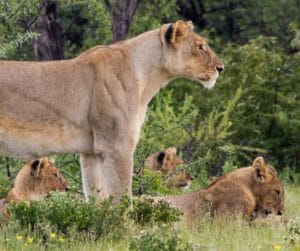
In the psychological concepts of nature versus nurture, some may wonder, “are great leaders born or made?” Certain personality factors contribute to one’s leadership skills, known as “trait theory.” This early leadership concept was studied in the mid-1800s by Charles Darwin’s cousin, Francis Galton. Galton believed that some people were natural-born leaders. In 1948 trait theory was challenged but resurfaced in the mid-1980s. Kouze and Posner, two leaders, brought trait theory to the forefront with a best-selling book, “The Leadership Challenge.” In this book, they list ten personality traits of influential leaders.

Various studies conclude that more than 100 traits contribute to making an effective leader.
Here are eight personality traits that great leaders seem to have:
- Confidence: A confident leader has a positive outlook on the future and takes risks. Confidence can be built up over time, which is a factor that contributes to making a great leader.
- Communication: Excellent communication skills can be learned and sharpened to make a great leader. Leaders who listen, display assurance in their body language, and have effective speaking mannerisms.
- Self-awareness: The best way to develop as an effective leader is through self-awareness. When leaders know their identity, behaviors, and emotions, they will be more open and successful.
- Charisma: Having natural charm helps a leader stand out in a crowd. Through cultivating and training emotional intelligence, a leader can go from good to great.
- Empathy: Understanding and being aware of others’ needs plays a critical role in effective leadership. Empathy is an intrinsic personality trait of great leaders but can be worked on to some degree. A leader lacking empathy can cause damage to their employees or company.
- Honesty: Being honest and having integrity helps leaders build trust amongst their employees. When leaders take responsibility for their actions and stand by their word, they will inspire and motivate their team. No one is born with honesty and integrity; therefore, these two traits are part of development.
- Perseverance: Overcoming obstacles through unrelenting perseverance makes a more effective leader. When a leader does not give up despite setbacks, they will grow stronger personally and professionally. Perseverance requires determination and the right mindset. A leader is not born with this trait; they acquire it.
- Learning Agility: Leaders who possess the capacity and willingness to learn become valuable to their company and team. Leaders who adapt and continuously work on their personal and professional growth become stronger and more inspirational. The trait of learning agility is something that develops over time.
Looking at the eight common traits, we can conclude that great leaders are made, not born. An effective leader needs to have some innate characteristics, but many factors come from personal growth. For anyone who strives to become a leader but may lack confidence, you can do it and be great!
Learn how to Lead Staff Members You Dislike and about the Different Types of Leadership.
